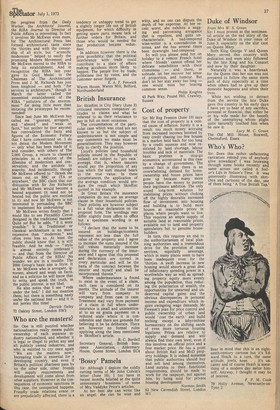Cost of property
Sir: Mr Reg Freeson (June 10) says that the cost of property is a central cause of inflation. Surely it is a result: too much money accruing frorn increased incomes boosted by easy credit chasing too few houses in a market held back for too long by a credit squeeze and now restricted by land shortage, labour troubles and lack of materials. The basic problem is stop-go economics, accentuated in this case by a change of government. The central fact is that there is an overwhelming demand for homeownership and house prices have gone up because many more people have the money to pursue their legitimate ambition. The only sound long-term solution for stabilising prices without choking off the highly desirable increased flow of investment into housing and building is to build more houses at reasonable prices in places where people want to live. This requires an ample supply of suitable land at reasonable prices, available not to land and property speculators but to genuine housebuilders.
In turn, this requires an end to the authoritarianism of local planning authorities and a tremendous drive for the provision of main services, especially sewerage, which in many places seem to have been inadequate even for the 'thirties. A swift increase in new housing would absorb a great deal of inflationary spending power in a worthwhile way as well as spreading property equity more evenly among the population, thus reducing the polarisation of wealth, the opportunities for unearned and undeserved capital gains and the obvious discrepancies in personal income and expenditure which inspire swingeing wage demands. Mr Freeson's plan for price control and public ownership of urban land would 'cost the earth' and build nothing except a labyrinthine bureaucracy on the shifting sands of even more tortuous housing legalisms. Prices are relative to supply and demand and will always find their own level, even if this involves an official price and a free market price. He has a point about British Rail and MoD prop erty holdings, It is indeed nonsense that public authorities should buy and sell land among themselves. Land surplus to their functional requirements should be made to work for the taxpayer, not against him, by being sold for private housing development.
Norman Smith 82 New Cavendish Street, London W I






















































 Previous page
Previous page